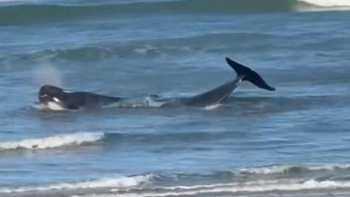
UPDATED 12.19AM: Prime Minister John Key has confirmed he will be attending Waitangi, and will be allowed to speak at Te Tii Marae.
He was officially invited by the Marae's trustees, despite a vote yesterday taken by hui which barred him from entering.
Mike's Minute: Waitangi an 'ungodly circus' that should be canned
Rachel Smalley: Closing the door on dialogue
Key said there would still lots of protesters attending, and so he would be taking a full security contingent.
If the security team decides that it is too dangerous for Key or his staff, he might not make it on to the Marae.
"In principle we're doing everything we can to get there, but if they physically block us we won't be able to go," Key said.
Yesterday Ngapuhi Iwi leaders voted 38-14 against Prime Minister Key being allowed on to the Marae because of their opposition to the ultra-controversial TPP free trade deal being signed in Auckland tomorrow.
Ngapuhi elder Kingi Taurua said the hui had been held and the decision was final: "Ngapuhi will not support the Prime Minister coming on Te Tii Marae. It is not a Te Tii Marae issue, it is a Ngapuhi issue."
Taurua said it wouldn't be appropriate for the Prime Minister to visit the marae the day after he signs the TPP.
However, local Labour Party MP Kelvin Davis, who attended the hui, said he spoke to elders like Titewhai Harawira and trustees, and they insisted Key will be invited because it's Maori protocol.
Key himself has stated yesterday that if he doesn't get speaking rights, he'll celebrate the day in another part of the country.
Te Tii Marae has for many years been the scene of political protests over various issues, and Key stated that he was worried about the images that come from the lower marae on Waitangi Day.
"I think sometimes it reflects badly on our country because we look across the Tasman for instance at what we see in Australia, in Australia is signs and pictures of great celebration on their national day," he claimed.
"Sometimes I think the wrong images are portrayed."
Treaty Negotiations Minister Chris Finlayson has said that if the Prime Minister does not attend, he won't either.
"I wouldn't go on. I'd be most unhappy about going on. I think it's highly discourteous to the head of the government to behave in this way," Finlayson stated.
Green Party co-leader Metiria Turei insists it's a two-way relationship and Key needs to work with his hosts.
"If he wants to have the right to address both the political issues that are being debated on the Marae, he has to work with his hosts, just as they would expect to work with him and his people when they come here to parliament."
Refusing to attend Ti Tii, where politicians are usually invited to acknowledge local iwi before proceeding to the Upper Marae, is not unprecedented: Former Prime Minister Helen Clark skipped Te Tii after she was brought to tears in 1998.
Clark returned briefly in the early 2000s but gave up after she was jostled.
Key has kept a pledge to attend every year since 2007.
Ngapuhi's apparent protest over the signing of the TPP comes after leaders from Tainui and Kingitanga laid down challenges to the Prime Minister at Ratana commemorations late last month.
They urged a delay in the signing of the trade deal "until a comprehensive consultation, discussion and debate with all of those across the country can be held".
That prompted an assurance from Prime Minister Key that Maori interests weren't compromised by the TPP, a view also expressed in the government's own National Interest Analysis on the deal.
The Analysis insisted the TPP contains a Treaty of Waitangi exception, similar to one used in other free trade agreements.
AUT History Professor Paul Moon believes there's been a bit of scare-mongering about the way the deal works in relation to treaties.
"Since 2001 we've had similar provisions in a lot of other free trade agreements we've entered in to," he said.
"If there was a risk of our sovereignty being violated or Maori rights being violated, it's likely it would have already occurred."
Take your Radio, Podcasts and Music with you









